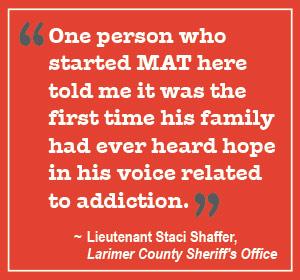
Expanding medical treatment for drug and alcohol addiction
By Julie Estlick
Every time Dr. Lesley Brooks gives a talk or hosts a presentation about substance use disorders, she hears a powerful story from an audience member about a loved one affected by addiction.
“Addiction impacts so many families that I think people just refuse to remain silent any longer,” Brooks says. “They are demanding help.”
Forming an addiction to drugs or alcohol is a process rooted in brain science and has very little to do with will power or moral strength, explains Brooks, who co-chairs the Northern Colorado Opioid Prevention Workgroup (NCOPW). Opioids, for example, are a highly addictive class of drugs that includes prescription pain medicine and illegal street drugs such as heroin.
 When addiction takes hold, the brain is rewired to function as if drugs are essential for survival. It’s a chronic disease like cancer or diabetes, and like those diseases, addiction can be treated with evidence-based medical care such as Medication-assisted Treatment (MAT).
When addiction takes hold, the brain is rewired to function as if drugs are essential for survival. It’s a chronic disease like cancer or diabetes, and like those diseases, addiction can be treated with evidence-based medical care such as Medication-assisted Treatment (MAT).
MAT is the use of FDA-approved medications—in combination with counseling, behavioral therapies, and sustained follow-up care—to treat addiction. These drugs work by relieving withdrawal symptoms and/or blocking the euphoric effects of the substance in the brain. Once a person’s cravings are curbed, the brain can gradually recover from the chemical changes caused by addiction.
While MAT can be used to treat alcohol use disorder and smoking, it’s also effective in treating everyone from the soccer mom who becomes addicted to narcotic pain relievers after knee surgery to the person serving a jail sentence for crimes committed to support a heroin addiction. In 2017, 2.1 million people in the United States had an opioid use disorder and nearly 68 percent of overdose deaths involved opioids. Year after year, Larimer County residents have also been impacted by fatal drug overdoses that touch countless lives.
Unfortunately, not everyone who needs MAT has been able to access it in northern Colorado. A lack of a system for supporting patients and tracking outcomes after treatments made some doctors hesitant to prescribe it. So, the NCOPW went to work and found a solution: Use federal grant monies to close the gap by developing a team of care coordinators to work directly with patients receiving MAT at clinics in the Colorado Opioid Synergy Larimer and Weld (CO-SLAW) network of care. CO-SLAW is a project that aims to increase access and delivery of MAT to people living with opioid use disorders in Larimer and Weld counties.
The care coordinators are people stationed onsite at clinics who set up appointments for treatment, call patients to check on their progress, and connect them to resources in the community. They are often instrumental in getting patients the right level of care depending on how they respond to different treatments, Brooks adds.
Anyone can reach a MAT care coordinator by calling 1-844-944-7529. In fact, area Emergency Department providers are starting people on MAT who arrive in drug withdrawal or after an overdose and request it, and then calling the 844 number to get people connected with a care coordinator before they leave.
Across the criminal justice system, MAT has been found to reduce criminal activity and arrests, as well as help prevent repeat offenders cycling through the system, according to the federal Substance Abuse and Mental Health Services Administration. Everyone is safer when people living with addiction can get the help they need, and the cost savings can put money back into community coffers.
The Larimer County Jail began offering MAT in the spring, and over 250 inmates have either started addiction treatment or continued following their current program while in jail, according to Larimer County Sheriff’s Office Lieutenant Staci Shaffer. While it’s too early for any local data on results, inmates report improved mental and physical health.
“One person who started MAT here told me it was the first time his family had ever heard hope in his voice related to addiction.”
| Local MAT Resources |
|---|
| One Call 1-844-944-7529 MAT care coordination and treatment hotline for Larimer and Weld counties. Appointments are scheduled at a community MAT facility within 24-48 hours. |
| SummitStone Walk-in Crisis Clinic Available 24/7. 1217 Riverside Ave., Fort Collins 970-494-4200 |
| changingmindslarimer.org/treatment-works Information on brain science and local resources. Contact bferrans@healthdistrict.org or 970-224-5209 to schedule a group presentation. |
|
IT MATTTRs 2 |
|
Connections |